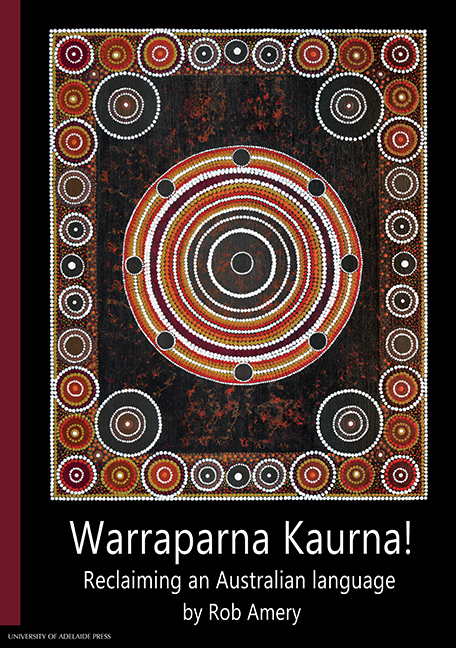Book contents
- Frontmatter
- Contents
- Maps, Plates, Graphs and Tables
- Preface to this Edition (2016)
- Foreword to the 2000 Edition
- Preface to the 2000 Edition
- Acknowledgements
- Abbreviations
- Conventions and Terminology
- Chapter 1 Locating the Study
- Chapter 2 Language Reclamation
- Chapter 3 An Ecological Approach to Language Revival
- Chapter 4 A Sociolinguistic History of Kaurna
- Chapter 5 Kaurna Sources
- Chapter 6 Restoring and Transforming the Kaurna Language
- Chapter 7 Kaurna Language Programs
- Chapter 8 Kaurna in Society
- Chapter 9 Kaurna Language Revival: The Formulaic Method
- Chapter 10 Sociopolitical Dimensions of Kaurna Language Revival
- Chapter 11 Into the Twenty-first Century: Developments since 2000
- Chapter 12 Summary and Conclusions
- Bibliography
- Index
Chapter 2 - Language Reclamation
Published online by Cambridge University Press: 28 July 2017
- Frontmatter
- Contents
- Maps, Plates, Graphs and Tables
- Preface to this Edition (2016)
- Foreword to the 2000 Edition
- Preface to the 2000 Edition
- Acknowledgements
- Abbreviations
- Conventions and Terminology
- Chapter 1 Locating the Study
- Chapter 2 Language Reclamation
- Chapter 3 An Ecological Approach to Language Revival
- Chapter 4 A Sociolinguistic History of Kaurna
- Chapter 5 Kaurna Sources
- Chapter 6 Restoring and Transforming the Kaurna Language
- Chapter 7 Kaurna Language Programs
- Chapter 8 Kaurna in Society
- Chapter 9 Kaurna Language Revival: The Formulaic Method
- Chapter 10 Sociopolitical Dimensions of Kaurna Language Revival
- Chapter 11 Into the Twenty-first Century: Developments since 2000
- Chapter 12 Summary and Conclusions
- Bibliography
- Index
Summary
Now I don't see it as something that has been written by goonyas, therefore weshouldn't embrace it. It is there. It's ours. It has been recorded for us and indeedin some of those recordings our people are talking to us. But we need to decodeit.
(Lester Irabinna Rigney, interviewed by Jenny Burford, 21 October 1997)Language reclamation: preliminaries
I use the term language reclamation specifically to refer to language revival in situations where the language is no longer spoken and little is known orally within the community (Amery, 1994: 146; SSABSA, 1996a; Mercurio & Amery, 1996: 48). The term refers to attempts to relearn a language from material recorded in another era, when the language was spoken. The term reflects the politics of Indigenous rights. As the quotation above indicates, such a revival is associated with the reclaiming of identity and culture from which a people have been dissociated. The term ‘language reclamation’, used in this way, was coined by Mary-Anne Gale and myself in 1992. Prior to that I had been using the term language resurrection in relation to Kaurna, but rejected this term because of its inherent view of such languages as ‘dead’ or ‘extinct’, and its unwelcome religious overtones. Perhaps others have used the term independently of my usage, even before 1992. Dick & McCarty (1997) use both ‘reclaiming’ and ‘renewal’ in relation to Navajo in the title of their paper. Van Heerden (1991) talks of militant Black writers in South Africa ‘reclaiming’ Afrikaans ‘as their personal language’ and as ‘the language of Liberation’, in a conscious effort to break the stigma of apartheid. This use is quite different from my own.
Some writers (e.g. Paulston et al., 1994: 92) use the term language revival in a narrow, restrictive sense:
We intend the literal meaning of language revival; that is, the giving of new life to a dead language, or the act of reviving a language after discontinuance, and making it the normal means of communication in a speech community.
I use it, however, as most other writers do, as a cover term both for situations in which a language is undergoing a resurgence and for measures taken to extend the domains of usage of a language, increase the number of speakers or indeed to reintroduce a language after it has ceased to be spoken.
- Type
- Chapter
- Information
- Warraparna Kaurna!Reclaiming an Australian language, pp. 19 - 40Publisher: The University of Adelaide PressPrint publication year: 2016



